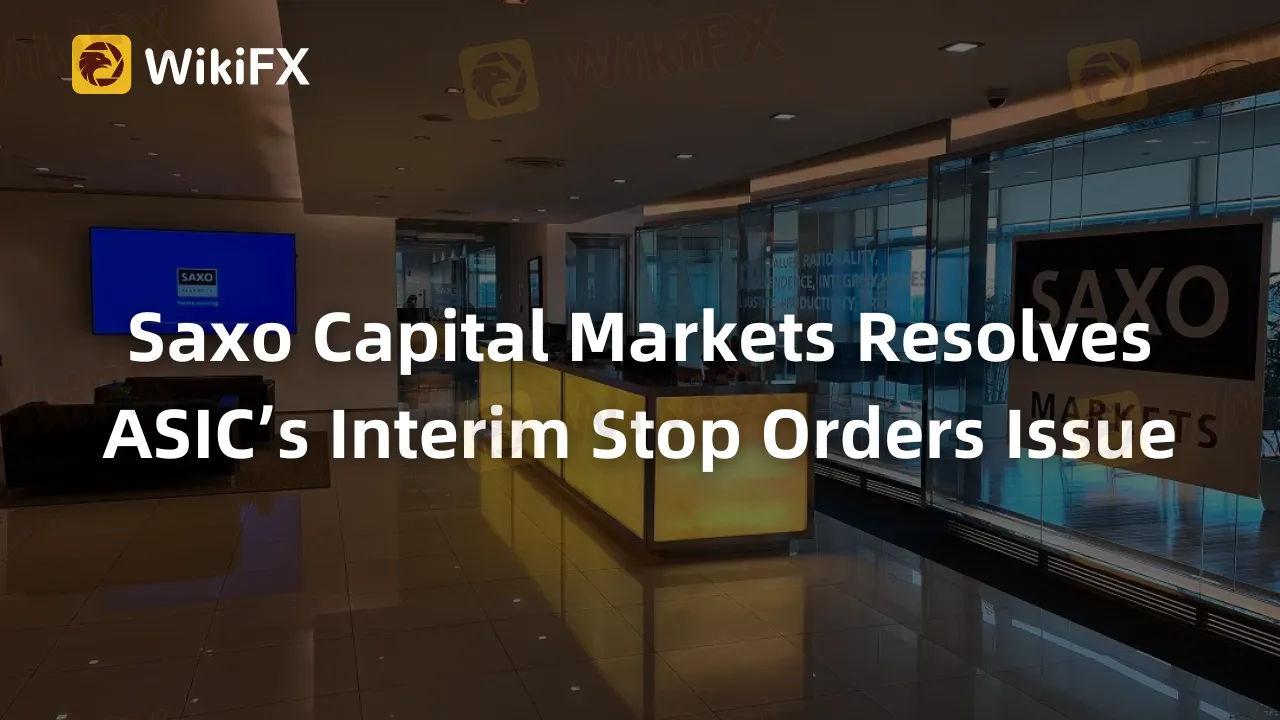简体中文
繁體中文
English
Pусский
日本語
ภาษาไทย
Tiếng Việt
Bahasa Indonesia
Español
हिन्दी
Filippiiniläinen
Français
Deutsch
Português
Türkçe
한국어
العربية
Saxo Capital Markets Resolves ASIC’s Interim Stop Orders Issue
Abstract:Saxo Capital Markets (Australia) resolved eight interim stop orders from the Australian Securities and Investments Commission (ASIC) concerning new contracts for difference (CFDs) for retail clients. The orders were lifted after Saxo amended its target market determinations (TMDs), addressing ASIC's concerns over potential retail client losses.

Saxo Capital Markets (Australia) Limited, after having faced eight interim stop orders from the Australian Securities and Investments Commission (ASIC), managed to turn things around on May 18, 2023. The orders, initially issued on May 16, 2023, were instated due to concerns over inadequacies in Saxos target market determinations (TMDs) for new contracts for difference (CFDs) to be issued to retail clients. After Saxo amended its TMDs, addressing the ASIC's apprehensions, the orders were revoked.
Saxo Restricted from Offering Eight Derivatives
The temporary stop orders had barred Saxo from issuing eight types of derivatives to retail clients and setting up new trading accounts for these clients. The derivatives included Single Stock CFDs, FX CFDs, ETFs CFDs, Index CFDs, Commodity Futures CFDs, Bond CFDs, Index Option CFDs, and Cryptocurrency Derivatives. The orders remained active for 21 days or until an earlier revocation.

ASIC‘s Concerns with Saxo's TMDs
ASIC expressed concern that Saxo’s TMDs inappropriately included retail clients intending to use CFDs as a major part of their investment portfolio, and clients with an investment timeframe of up to one or three years, considering the potential significant aggregate overnight financing fees. ASIC's concern also extended to clients seeking growth and income via Single Stock CFDs, ETF CFDs, and Index CFDs, as the high proportion of CFD retail clients often loses money trading CFDs.
ASICs Effort to Protect Retail Clients
ASIC states that the interim orders were established to shield retail clients from obtaining CFDs from Saxo, which may not align with their financial objectives, situation, or needs. However, the orders did not hinder existing Saxo clients from altering or closing their CFD positions.
ASIC's Emphasis on Design and Distribution Obligations
The ASIC highlighted the importance of issuers adequately defining target markets for their products under the design and distribution obligations (DDO). Issuers are required to account for the risks and features of their products and strategize product distribution to ensure alignment with the target market.
Track Record of ASIC‘s Interim Stop Orders
Up to now, ASIC has issued 36 interim stop orders under DDO, Saxo CFDs being part of these. From the 36 orders, 31 have been revoked following amendments or withdrawals of the products in response to ASIC’s concerns, while five are still effective.
ASICs Call for Improvement
Earlier in May, ASIC urged investment product issuers to 'up their game', following an initial review that revealed significant opportunities for enhancing compliance with design and distribution obligations.
Download and install the WikiFX App on your smartphone to stay updated on the latest news.
Download the App here: https://social1.onelink.me/QgET/px2b7i8n

Disclaimer:
The views in this article only represent the author's personal views, and do not constitute investment advice on this platform. This platform does not guarantee the accuracy, completeness and timeliness of the information in the article, and will not be liable for any loss caused by the use of or reliance on the information in the article.
Read more

Malaysian-Thai Fraud Syndicate Dismantled, Millions in Losses Reported
The Royal Malaysia Police (PDRM) has received 26 reports concerning the Nicshare and CommonApps investment schemes, both linked to a major fraudulent syndicate led by a Malaysian citizen. The syndicate’s activities came to light following the arrest of its leader by Thai authorities on 16 December.

WikiFX Review: Is FxPro Reliable?
Founded in 2006, FxPro is a reputable UK-based broker, trading on various market instruments. In this article, we will help you find the answer to one question: Is FxPro reliable?

Top 10 Trading Indicators Every Forex Trader Should Know
Master the top 10 Forex trading indicators to analyze real-time Forex quotes, trends, and market signals. Learn strategies to boost accuracy and avoid mistakes.

Why Do You Feel Scared During Trade Execution?
Trade execution is a pivotal moment for traders. It is when analysis turns into action, and potential profits or losses become reality. However, for many traders, this moment is accompanied by fear. Why does this happen, and how can you address it?
WikiFX Broker
Latest News
Geopolitical Events: What They Are & Their Impact?
Top 10 Trading Indicators Every Forex Trader Should Know
ASIC Sues Binance Australia Derivatives for Misclassifying Retail Clients
WikiFX Review: Is FxPro Reliable?
Malaysian-Thai Fraud Syndicate Dismantled, Millions in Losses Reported
Why Do You Feel Scared During Trade Execution?
WikiFX Review: Something You Need to Know About Markets4you
Revolut Leads UK Neobanks in the Digital Banking Revolution
Fusion Markets: Safe Choice or Scam to Avoid?
SEC Approves Hashdex and Franklin Crypto ETFs on Nasdaq
Currency Calculator


